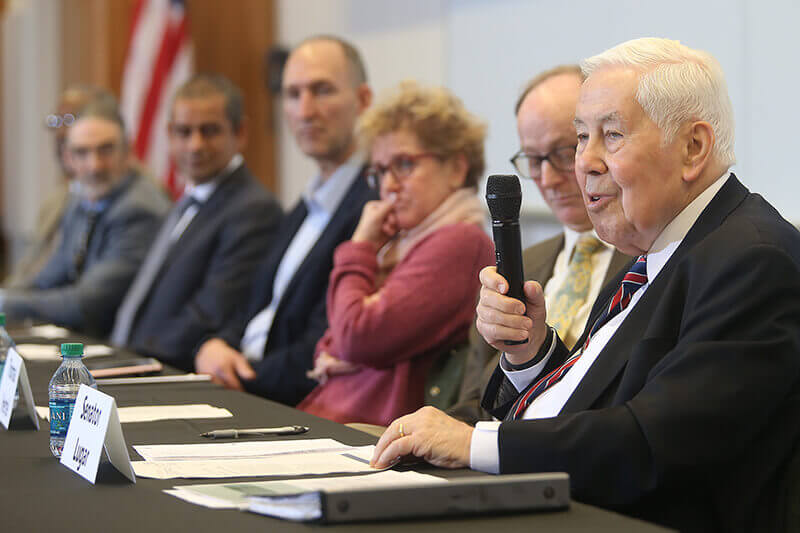May 1, 2018
Food security panel calls for more education, collaboration
 Former U.S. Sen. Richard Lugar participated in a roundtable discussion on issues of global food security on April 30 in Deans Auditorium at Pfendler Hall. The discussion was hosted by the College of Agriculture and facilitated by Karen Plaut, the interim dean of the College of Agriculture. (Purdue University photo/Tom Campbell)
Download image
Former U.S. Sen. Richard Lugar participated in a roundtable discussion on issues of global food security on April 30 in Deans Auditorium at Pfendler Hall. The discussion was hosted by the College of Agriculture and facilitated by Karen Plaut, the interim dean of the College of Agriculture. (Purdue University photo/Tom Campbell)
Download image
Richard Lugar, former U.S. senator from Indiana, joined a panel of six College of Agriculture faculty and staff members Monday (April 30) for a roundtable discussion on global food security.
Lugar, currently serving as president of The Lugar Center, a Washington, D.C.-based nonprofit organization focusing on global food security, weapons of mass destruction nonproliferation, aid effectiveness and bipartisan governance, emphasized the important role of research and education in fighting global hunger.
"We really have to support universities in about every country in the world," he said. "They will share our research, and we will learn from them. There has to be some basis on which countries gain the knowledge that is required to have some hope for food sufficiency."
Lugar was joined on the panel by Sylvie Brouder, professor of agronomy; Gary Burniske, managing director of the Purdue Center for Global Food Security; Indrajeet Chaubey, professor of agricultural and biological engineering; Gebisa Ejeta, Distinguished Professor of Agronomy and 2009 World Food Prize laureate; Thomas Hertel, Distinguished Professor of Agricultural Economics and founder and executive director of the Global Trade Analysis Project; and John Lumkes, professor of agricultural and biological engineering. Karen Plaut, interim dean of the College of Agriculture, hosted the panel.
Panelists addressed the complexity of food insecurity and its relationship to economic, political, geographic and cultural factors.
"We've talked about water quality, we've talked about soil health, we've talked about mechanization, we've talked about global to local, we've talked about the role of universities and Extension research and education in making this happen," Plaut said. "It's all of us that will make the difference in the long term."
Ejeta noted that roughly 800 million people around the world experience food insecurity, many of them children. He stressed that the issue must be addressed across disciplines.
"There is not a better model for the transdisciplinary approaches than the land-grant university model of education, research and Extension," he said.
Brouder said developing new technologies was not enough -- those technologies had to be practical and useful for producers around the world.
"Part of our role as a land-grant university is to identify the technologies that can be adopted and show how they should be adopted," she said.
Following the panel discussion, Lugar continued his campus visit with a tour of the Purdue forestry and natural resources farm that bears his name.
The Richard G. Lugar Forestry Farm was named in 2014 to honor the former senator's longstanding commitment to science-based advances in forestry. The 175-acre farm promotes production of improved hardwoods to benefit Indiana's vital forest products industry. It operates primarily under the auspices of the Purdue Hardwood Tree Improvement and Regeneration Center, which Lugar helped create.
Writers: Emma Ambrose, 765-494-2406, eeambros@purdue.edu
Darrin Pack, 765-494-8415, dpack@purdue.edu

